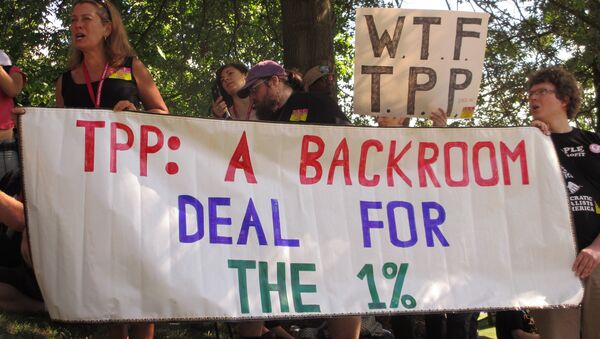Zahara Heckscher, who was arrested for protesting against the secretive talks amid a meeting of international trade ministers in Atlanta, said the lack of transparency with trade talks for agreements such as TPP was threatening the rights of regular citizens.
"The secrecy here is undemocratic and unjust. It leads to big corporations being able to influence the policies and proposals, whereas civil society groups who actually represent the majority of the population are cut out."
"We can’t even see the draft text of what they’re negotiating over," she told Sputnik, noting that the most enlightening information campaigners had received was due to a series of leaked documents.
Ms Heckscher noted that while the leaks were helpful and crucial, "this doesn’t give us live time access to what they’re negotiating. It’s completely secret and it’s unacceptable in countries that are calling themselves democratic to have negotiations that are really anti-democratic. I do agree that we need much more transparency in these trade agreements".
There has been huge public criticism of the TPP and other mega trade agreements such TTIP and CETA. Critics concerned about the lack of transparency have also raised fears that such deals will merely benefit large companies – at the expense of regular citizens.
TPP threatens access to the type of meds that keep me alive. See my story, please act now http://t.co/V2LhHUlmoJ pic.twitter.com/P53ihRlBXg
— zahara heckscher (@ZaharaHeckscher) September 24, 2015
Mr Heckscher, who is a cancer survivor, was protesting against potential developments that she believes could extend drug company monopolies over certain types of cancer-fighting drugs, which she says would lead to a dramatic increase in cost.
"They [TPP negotiators] don’t want civil society organizations in there [formal discussions] because our message is really strong. We have a lot of popular support," she said.
"Who doesn’t want more accessible medicines? Who doesn’t want more affordable drugs? Really the only people who don’t want the prices to go down are the drug companies themselves and the government officials who are representing the companies."
"It’s kind of ironic that they call it a free trade agreement, when really what they’re talking about here, what they’re negotiating is how long they should extend the monopolies for these life-saving medicines. Extending the monopolies is going to cost lives because people can’t afford the tens or hundreds of thousands of dollars that some of these medicines cost."
"They’re trying to spin the TPP as something that will improve lives and lift up all ships, but we know not just this part, but other parts of the TPP as well are going to have a negative effect on regular people."
Critics have said that agreements such as the TPP will merely benefit the top one percent of society. However, Ms Heckscher told Sputnik that she believes the people to benefit from such a deal would be an even smaller proportion for the population.
"I have asked myself the question over and over again. Why are they pushing this TPP that includes provisions, like this death sentence clause, that are against the interests of the majority of the people.
Who benefits from "free trade?" Workers? Nope! Multinational corps? Ding, ding ding! http://t.co/kxjH17c84h #StopTPP pic.twitter.com/NjyZdwJ9wJ
— Global Trade Watch (@PCGTW) October 2, 2015
"All I can come up with is that it’s not just the one percent, it’s the one percent of the one percent that’s going to benefit financially and there are huge financial benefits – billions of dollars — at stake for this teeny peeny minority of people who benefit, when for example, drug companies get to keep their monopolies."
The US-headed TPP is a proposed trade agreement being negotiated by 12 Pacific rim countries, including Australia, New Zealand, Singapore, Peru and Japan while there are potentially another five nations that have announced their interest in joining the agreement.




